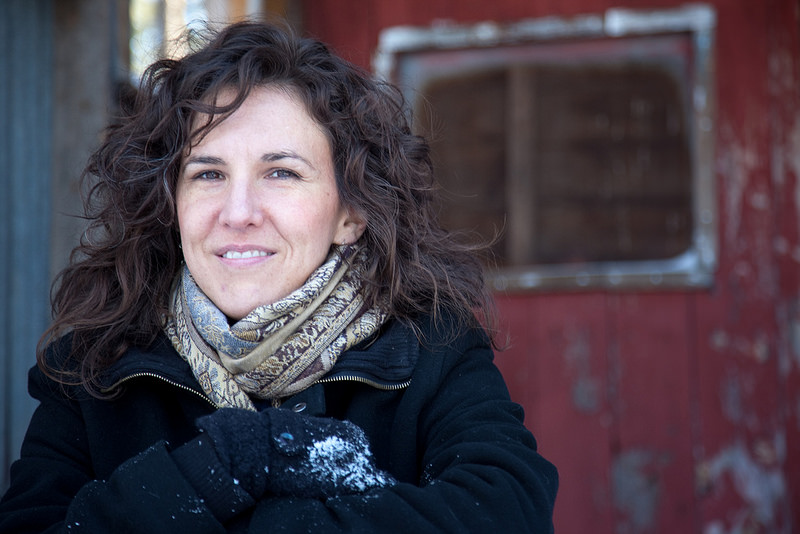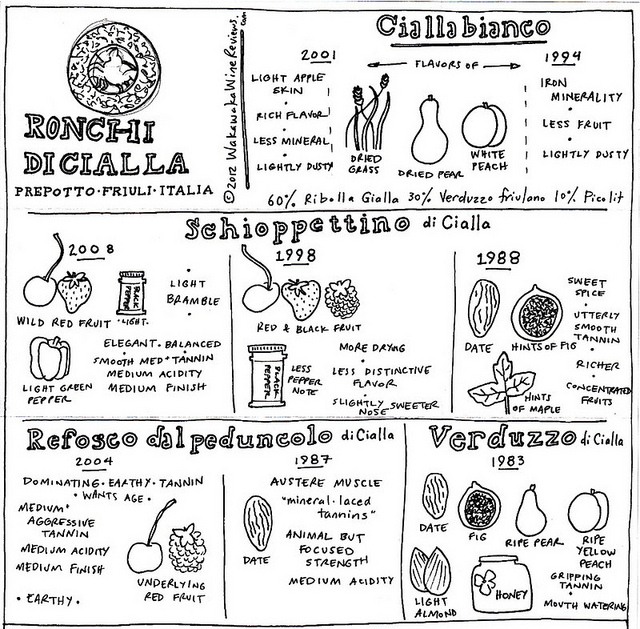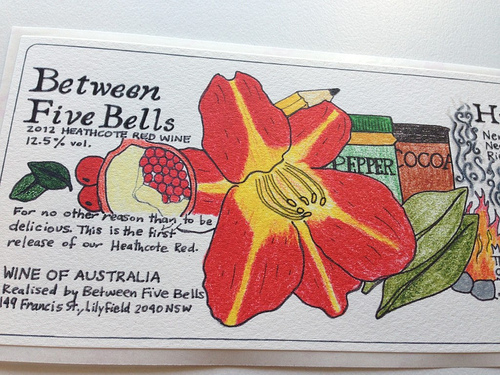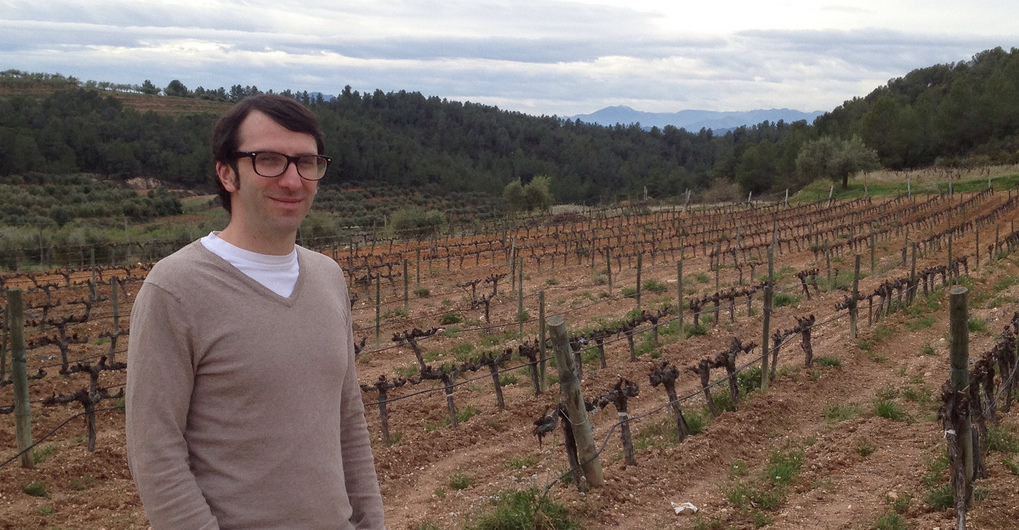
Just your typical story of a philosophy professor at Northern Arizona University who decides to step away from academia and pursue a life of wine—
That’s only the tip of the iceberg when you get to know Elaine Chukan Brown through her blog, Hawk Wakawaka Wine Reviews. Not only does she write about wine and the people connected to it, she also draws charming comics that serve as visual tasting notes. You might find a pepper grinder, a halved fig, or a honey jar on her pages.
Elaine, who lives in Sonoma, Calif., travels up and down the state frequently researching wine, but blink and she might be in the Languedoc, Australia, or Friuli. And possibly Champagne (I hope).
We talk about the links between philosophy and wine, creating a wine label, getting personal with her subject matter, and what’s in her fridge.
What was the first blog post you ever wrote, and looking back on it, what is your reaction to it today?
I’d written personal blogs before starting Hawk Wakawaka Wine Reviews. My daughter and I lived in French Canada for several years. She went straight into the French School Board in Montreal, even though I don’t speak French. By November she had picked up the language.
Still, the only person in her school who spoke English was the principal. I’d get phone calls from him if there was an emergency like a snow day school evacuation, but he’d also call for little things. He called one time to tell me my daughter’s lunch didn’t have enough protein in it. We’d just run out of peanut butter. I thought, how does the principal have enough time in his day that he wants to give a “Be a Better Mommy” course to the only Anglophone at the school?
So I started a blog to tell these silly little stories about our daily life in Montreal. Thanks to that, by the time I started writing about wine, blogging wasn’t anything new to me. It was just a straightforward way to share stories, ideas, and information.
With wine, my first blog post was a hand-drawn review of a Napa Cabernet—the Volunteer—for my friend Fred. Looking back, it blows my mind I went from that one image to everything I’ve gotten to do since.
You write a wine blog, but often you touch on personal stories about life and family. And not just the happy moments (of which there are many)—you’re also very candid about challenges and painful difficulties. In this context, what is the goal of your blog? Does wine have to fit in with every aspect of life you explore on your site?
I love wine, and I need the kind of multi-layered experience I get with it. Wine offers me the intellectual challenge I need, the sensual experience I want, and a subject to write about. So I don’t want to undermine how much work I put into tasting, studying, and enjoying wine, because it’s a lot. I often write purely about wine.
I also do more formal wine writing in more formal publications. Since Hawk Wakawaka Wine Reviews is a wine blog though, not a wine magazine, I have different leeway. I want to keep wine in an overtly human context. For those of us who enjoy wine, it’s an ongoing part of our lives. So let’s connect it to the experiences of our life in our writing too.
People open up and share very personal stories with me when I interview them. I am careful not to reveal more in the profiles than a person would want to be public. It’s [more important] that those intimate stories inform my understanding of the person, rather than that I reveal the specifics.
My writing about my own life on my blog, then, partially is a way of returning the favor, if that makes sense. If I want people to feel comfortable being open with me, I have to be willing to be open too. I write about human experience. Some of it is painful. A lot of it is so beautiful.
As a philosopher, how does your background inform each wine that you taste? Is your academic and intellectual training something you call on in a rigorous manner?
Success in philosophy at the Ph.D. level and beyond depends on giving everything you are to it. I came from that kind of intense, rigorous training. The best philosophers I’ve known have their career and one hobby, but not more. I had philosophy and my daughter, rather than a hobby. So, when I decided to leave my career I wasn’t easily going to just step out of the high-level demand I’d been living for more than a decade. I needed something compelling to give my attention to.
Part of what made philosophy matter to me was its endlessness. That sounds crazy, but in philosophy you can work forever and never reach the end. There will always be another perspective, more detail that can be brought to the study. The elusiveness of that was important to me—it meant I could make progress on a subject without worrying about perfection. There wasn’t any to find but, even so, there was still progress to be made. Wine has that same elusiveness.
I bring in my research and critical thinking training and apply it to the region, the varieties, the viticulture, and winemaking processes I’m studying or tasting. The demand there is thoroughness and clarity. Then I bring that study forward with my writing training—take in advanced-level information, make it make sense, and write it out in a way that is accurate, accessible, concise, and adequate. Research more. Repeat.
The demand on me in my previous purely intellectual career was so high—how I could I not revel in the idea of doing good work on something like wine that is meant to be definitively about pleasure? It’s also the only thing I can offer, if I can offer anything. If we want to do good work in our life, we have to ask what is uniquely our own and then be willing to give it to others. Bringing my previous training to wine writing is something I can give.

How is drawing a wine via a comic different from just offering straight prose about it?
Drawing a wine pulls on a really different part of my head than writing does. Writing is integral to who I am, but drawing is a kind of relief. It resets my verbal thinking. As far as why draw about wine though, not everyone is a verbal thinker, so images of wine capture people that don’t respond to language descriptors so obviously.
What’s it like to see your drawings on a wine label?
One of the most special things I’ve ever done. I was able to bring a bottle of the wine, the Between Five Bells 2012 H-Cote, back to Flagstaff to share with friends there. My friend Fred is the managing partner of the Wine Loft in Flagstaff, and was also my first friend in that town. He got me started with everything I’m doing now in wine. Along with a couple of other people, we were able to drink the H-Cote together. Fred and his wife Hillary kept the bottle and have it on display in their home. I am so thrilled to have my drawing on a label. It feels really special. But what makes it truly meaningful for me is that I get to share it with people I love who love me too. I’ve since also drawn the 2013 of the same wine, and am excited to share that bottle once its released.
What are some go-to wines in your fridge right now? Or ones that you wish were in your fridge?
I love i Clivi’s white wines from Friuli. Their Ribolla Gialla is this utterly clean, straight-to-press style that pumps with the mineral clarity of that region. Their Friulano is a beautiful, pure expression of how lovely that grape can be.
If you have guests in town who’d like to visit some wineries, where do you like to take them? How about for lunch or dinner?
I plan these things based on who is visiting so my answer to this question would change a lot depending on what they like to drink and the sorts of places they like to see. A lot of the people I taste with on my own don’t have tasting rooms, and I try to be protective of their time. For a place with a tasting room, Corison is well worth the drive over to St. Helena, followed by a meal at Farmstead across the street. For cocktails, a stop in at Bouchon’s bar is great, and you can grab pastries for the next morning at Bouchon bakery next door.
If I could put you on a plane and send you to any wine region in the world, where would you like to visit and why?
Champagne. I have an important birthday at the end of August. Let’s get on a plane and go to Champagne to celebrate.
Who are your mentors, those who’ve inspired you as a wine writer?
I cannot say enough good things about Gerald Asher. He’s the best wine writer our country has ever had. His writing is such a resource, and there is such an impressive history of wine there.
Neil Beckett, the editor of World of Fine Wine, has inspired me through the way he sculpts that magazine. It’s such a high standard of accomplishment, and he is genuinely considerate of his writers.
Eric Asimov does a lovely job at bringing together story, information, and commitment to his subject matter in a journalistic framework. He listens to his subject and talks about different styles of wine in their context. I respect that a lot. It gives the reader a way to interpret Asimov’s wine perspective for themselves, rather than having him just say what wines should be liked.
Those are my standards for wine writing itself. The people I’ve met who are thoughtful and passionate about their work motivate me to write. Last year I spent at least 12 hours tasting and interviewing Greg Brewer to write about his Diatom wines. He is fascinating to taste with and talk to. That opportunity to spend so much time listening to him and working through where he was coming from in wine really motivated me to want to write that profile on him. It’s still one of my favorite pieces I’ve ever done. I like the how the writing itself turned out, but that I got to write that piece to express the work we both put in to it means a lot to me.
Most of all, when I’m tired and am disinclined to write, it’s friends who make the biggest difference. It’s the people we love who matter most.










